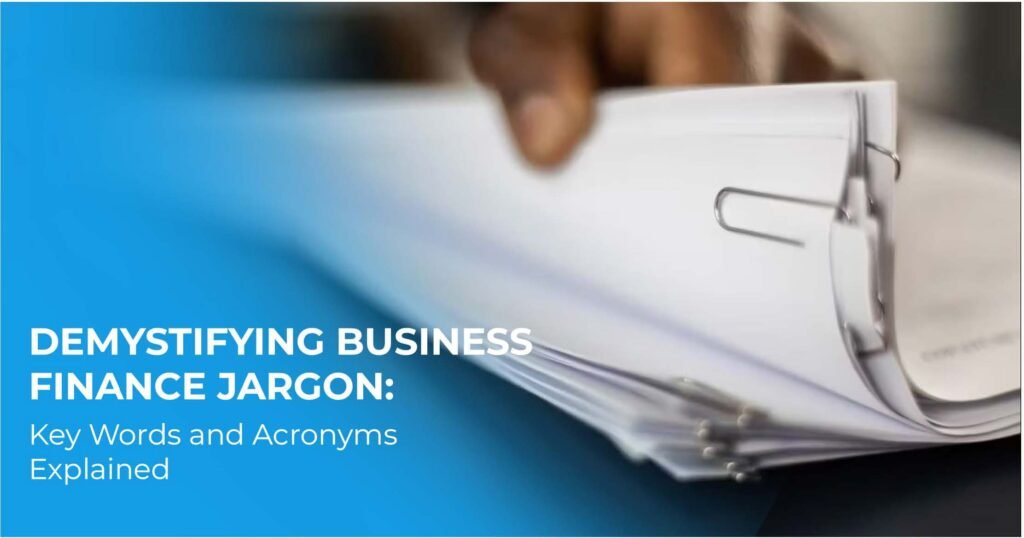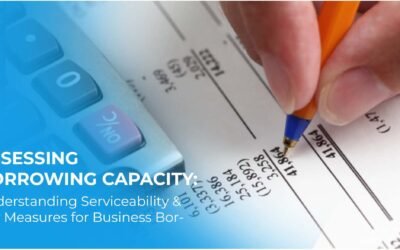Demystifying Business Finance Jargon

Unlock the mystery behind business finance jargon as we delve into commonly used words and acronyms that can impact your financial decisions. Gain a basic understanding of APRA, BBSW, LVR, EBITDA, and more, crucial for navigating the financiaI landscape. Empower yourself with knowledge and make informed choices for your business’s growth and success. Take the first step towards financial literacy by exploring these key terms and their meanings in our comprehensive guide.
JARGON
Here are some commonly used words and acronyms in business finance. It’s beneficial for borrowers to have a basic understanding of their meanings:
1. APRA:
Australian Prudential Regulation Authority. An independent authority responsible for supervising institutions in banking, insurance, and superannuation, and promoting stability in the financial system in Australia.
2. BBSW Bank Bill Swap Rate (BBSW):
The Bank Bill Swap Rate is a short-term benchmark interest rate in the money market. Along with the Bank is a short-term benchmark interest rate in the money market. Along with Bank Bill Swap Bid Rate (BBSY), it is a key base rate for commercial lending.
3.COLLATERAL:
Assets provided by a borrower to secure a loan serve as an assurance for the lender against significant loss.
4. DSR:
Debt Service Ratio. A measure of a business’s ability to make total loan repayments, including both interest and principal, relative to its EBITDA.
5. EBITDA:
Earnings before Interest, Taxes, Depreciation, and Amortization. It is a measure of performance that shows earnings before accounting and financial deductions.
6. LVR:
Loan-to-Value Ratio. The loan amount is divided by the property or business valuation, expressed as a percentage.
7. G&I:
Guarantee & Indemnity. A guarantee involves assuming responsibility for debt after the default of another party, while an indemnity is a direct liability to compensate for a loss caused by a third party.
8. GSA:
General Security Agreement. It is offered over a business’s general assets to provide security. In the past, this was represented as a “Charge over the business assets.”
9. IO:
Interest Only. It refers to repayments covering only the interest on the borrowed amount (the principal) for a specific period. Repayments may vary based on the utilized balance and the number of calendar days in a month.
10. DEFAULT INTEREST:
The amount a bank loses when a borrower defaults on a loan, taking into account any recovery, is represented as a percentage of the total exposure at the time of loss.
11. P&I:
Principal & Interest. This is the most common type of repayment, requiring payments toward both the loan principal and interest. Repayments are determined based on the interest rate.
12. NPAT:
Net Profit after Taxation. It represents the profit remaining after deducting taxes and interest and accounting for depreciation.
13. ROE:
Return on Equity. It measures how efficiently a business uses its equity to generate profit, calculated by dividing net profit after tax by total equity.
14. SERVICEABILITY:
Capacity. Lenders calculate this based on the overall net income position to determine the level of debt that can be serviced without a reasonable risk of default.
CONCLUSION
Understanding business finance jargon is essential for making well-informed financial decisions. The keywords and acronyms mentioned, such as APRA, BBSW, COLLATERAL, DSR, EBITDA, LVR, G&I, GSA, 10, DEFAULT INTEREST, P&I, NPAT, ROE, and SERVICEABILITY, play a critical role in navigating the financial landscape. By gaining a basic understanding of these terms, borrowers can empower themselves to assess loan options and evaluate risks and strategies for business growth and success. With this knowledge, you can confidently engage in financial discussions and make the best choices for your business’s future.
Take the first step toward financial literacy by utilizing this comprehensive guide to unlock the mystery behind business finance jargon. Don’t miss the opportunity to discuss your unique financial needs and explore tailored solutions for your business growth.
Book a meeting with us today and let’s pave the way to a prosperous financial future together!
Disclaimer:
The information provided in this blog is for educational purposes only and should not be considered financial advice. Always consult with a professional financial advisor or lender for specific lending decisions.





